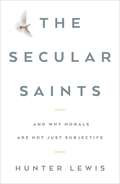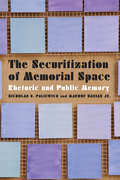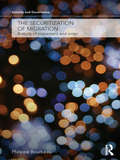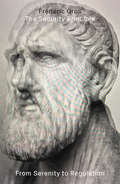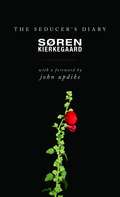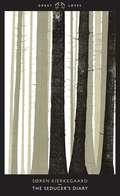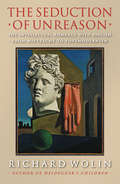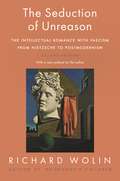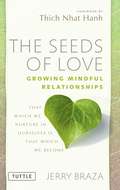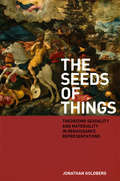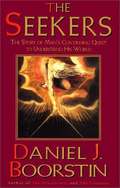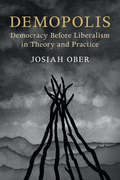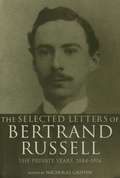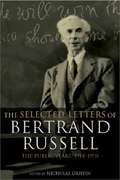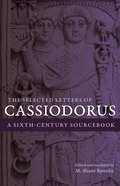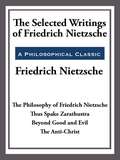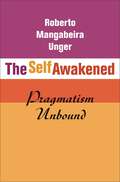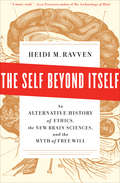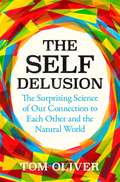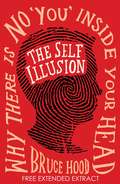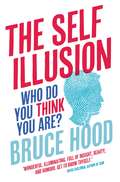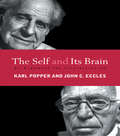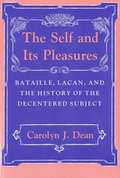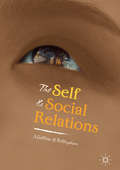- Table View
- List View
The Secular Saints: And Why Morals Are Not Just Subjective
by Hunter LewisThe term &“secular saint&” may immediately raise questions or even objections. Each religion specifies grounds for being considered a saint. What does it mean to be a secular saint? Presumably an exemplary life. But exemplary based on what? Exemplary according to whom? Perhaps an exemplary life is not even enough to qualify. Perhaps the life must also be inspiring or have something to teach us. But, again, inspiring or instructive according to whom?These questions are variants of the perennial question: are ethics and moral objective in some way or completely subjective? Is anybody&’s opinion worth hearing? Most people would agree that Hitler&’s morals were horrendous. But is there a way to distinguish good from bad without reliance on revealed religion?All of this in turn leads to questions humans have always asked themselves. What is right or wrong? What is good or bad or just less good? What is just or unjust? These are not just questions for confused or searching teenagers. Human beings are guided day by day by our beliefs and values, and are absolutely lost without this kind of guidance.This book provides &“brief lives&” and thoughts of some leading candidates for the term secular saint. Many of them are famous moral philosophers. Taken together, they offer a kind of history of moral thought. Some of them are not what we would today consider philosophers. All of them have much to teach us about how we lead our lives and think about the fundamental questions.This book also offers a conclusion: that morals and ethics are not just subjective, that they are grounded in very objective realities. There is such a thing as right and wrong, better and worse, and as thinking creatures we should recognize this and act on it.
The Securitization of Memorial Space: Rhetoric and Public Memory
by Nicholas S. Paliewicz Marouf Hasian Jr.The Securitization of Memorial Space argues that the National September 11 Memorial and Memorial Museum is a securitized site of memory—what Foucault called a dispositif—that polices visitors and publics to remember trauma, darkness, and victimage in ways that perpetuate the “necessity” of the Global War on Terrorism. Contributing to studies in public memory, rhetoric and argumentation, and critical security studies, Nicholas S. Paliewicz and Marouf Hasian Jr. show how various human and nonhuman actors participated in complicated argumentative formations that have mobilized political, performative, and militaristic practices of anti-terroristic violence in other parts of the world. While there were times that certain argumentative stakeholders—such as local New Yorkers—questioned the necessity of securitizing this site of memory, agentic factions including the families of those who died on 9/11, public supporters, security agents, and politicians created an ideologically oriented security assemblage that remembers 9/11 through counter-terroristic performances at Ground Zero. In chronological order from the 2001 “dustbowl” to the present popularization of 9/11 memories, the authors present seven chapters of rich rhetorical analysis that show how the National September 11 Memorial and Memorial Museum perpetuates grief, uncertainty, and angst that affects public memory in multidirectional ways.
The Securitization of Migration: A Study of Movement and Order (Security and Governance)
by Philippe BourbeauThe international movement of people is provoking worldwide anxiety and apprehension. Nation-states around the globe, especially Western ones, are cracking down on migration for security reasons. International migration has become a key security issue and is perceived, by some, as an existential security threat. The Securitization of Migration is about the movement of people and the system of order underpinning the movement. In undertaking a comparative study of Canada and France, the study analyzes the process of securitizing migration. It explores the process of discursively and institutionally integrating international migration into security frameworks that emphasize policing and defence. Drawing upon social theory, migration studies, and Securitization Theory, Philippe Bourbeau seeks to understand the concepts of power underlying security frameworks and how these affect the treatment of migrants and immigrants. This book is one of the first to systematically and comparatively examine the role of political agents, media agents, and contextual factors in the process of securitizing migration. The book will be of interest to students and scholars concerned with comparative and theoretical approaches to security and migration studies.
The Security Principle: From Serenity to Regulation
by Frederic GrosThe genealogy of the idea of security from ancient Greece to the war on terrorismIn The Security Principle, French philosopher Frédéric Gros takes a historical approach to the concept of "security", looking at its evolution from the Stoics to the social network. With lucidity and rigour, Gros's approach is fourfold, looking at security as a mental state, as developed by the Greeks; as an objective situation and absence of all danger, as prevailed in the Middle Ages; as guaranteed by the nation state and its trio of judiciary, police and military; and finally "biosecurity", control, regulation and protection in the flux of contemporary society. In this deeply thought-provoking account, Gros's exploration of security shines a light both on its past meanings as well as its present uses, exposing the contemporary abuses of security and the pervasiveness of it in everyday life in the Global North.
The Seducer's Diary
by Søren Kierkegaard"In the vast literature of love, The Seducer's Diary is an intricate curiosity--a feverishly intellectual attempt to reconstruct an erotic failure as a pedagogic success, a wound masked as a boast," observes John Updike in his foreword to Søren Kierkegaard's narrative. This work, a chapter from Kierkegaard's first major volume, Either/Or, springs from his relationship with his fiancée, Regine Olsen. Kierkegaard fell in love with the young woman, ten years his junior, proposed to her, but then broke off their engagement a year later. This event affected Kierkegaard profoundly. Olsen became a muse for him, and a flood of volumes resulted. His attempt to set right, in writing, what he feels was a mistake in his relationship with Olsen taught him the secret of "indirect communication." The Seducer's Diary, then, becomes Kierkegaard's attempt to portray himself as a scoundrel and thus make their break easier for her. Matters of marriage, the ethical versus the aesthetic, dread, and, increasingly, the severities of Christianity are pondered by Kierkegaard in this intense work.
The Seducer's Diary (Penguin Great Loves)
by Soren KierkegaardJohannes is an aesthete, dedicated to creating the possibility of seduction through the careful manipulation of young women. He stealthily pursues the innocent Cordelia until she becomes increasingly drawn to him. But when she is ready to give herself completely, she realizes she may have got everything wrong. United by the theme of love, the writings in the Great Loves series span over two thousand years and vastly different worlds. Readers will be introduced to love’s endlessly fascinating possibilities and extremities: romantic love, platonic love, erotic love, gay love, virginal love, adulterous love, parental love, filial love, nostalgic love, unrequited love, illicit love, not to mention lost love, twisted and obsessional love….
The Seduction of Unreason: The Intellectual Romance with Fascism from Nietzsche to Postmodernism
by Richard WolinFifteen years ago, revelations about the political misdeeds of Martin Heidegger and Paul de Man sent shock waves throughout European and North American intellectual circles. Ever since, postmodernism has been haunted by the specter of a compromised past. In this intellectual genealogy of the postmodern spirit, Richard Wolin shows that postmodernism's infatuation with fascism has been widespread and not incidental. He calls into question postmodernism's claim to have inherited the mantle of the left--and suggests that postmodern thought has long been smitten with the opposite end of the political spectrum.In probing chapters on C. G. Jung, Hans-Georg Gadamer, Georges Bataille, and Maurice Blanchot, Wolin discovers an unsettling commonality: during the 1930s, these thinkers leaned to the right and were tainted by a proverbial "fascination with fascism." Frustrated by democracy's shortcomings, they were seduced by fascism's grandiose promises of political regeneration. The dictatorships in Italy and Germany promised redemption from the uncertainties of political liberalism. But, from the beginning, there could be no doubting their brutal methods of racism, violence, and imperial conquest.Postmodernism's origins among the profascist literati of the 1930s reveal a dark political patrimony. The unspoken affinities between Counter-Enlightenment and postmodernism constitute the guiding thread of Wolin's suggestive narrative. In their mutual hostility toward reason and democracy, postmodernists and the advocates of Counter-Enlightenment betray a telltale strategic alliance--they cohabit the fraught terrain where far left and far right intersect.Those who take Wolin's conclusions to heart will never view the history of modern thought in quite the same way.
The Seduction of Unreason: The Intellectual Romance with Fascism from Nietzsche to Postmodernism, Second Edition
by Richard WolinEver since the shocking revelations of the fascist ties of Martin Heidegger and Paul de Man, postmodernism has been haunted by the specter of a compromised past. In this intellectual genealogy of the postmodern spirit, Richard Wolin shows that postmodernism’s infatuation with fascism has been extensive and widespread. He questions postmodernism’s claim to have inherited the mantle of the Left, suggesting instead that it has long been enamored with the opposite end of the political spectrum. Wolin reveals how, during in the 1930s, C. G. Jung, Hans-Georg Gadamer, Georges Bataille, and Maurice Blanchot were seduced by fascism's promise of political regeneration and how this misapprehension affected the intellectual core of their work. The result is a compelling and unsettling reinterpretation of the history of modern thought. In a new preface, Wolin revisits this illiberal intellectual lineage in light of the contemporary resurgence of political authoritarianism.
The Seeds of Love
by Thich Nhat Hanh Jerry BrazaUsing the garden as metaphor, The Seeds of Love offers a process for creating mindfulness. Through the development of the practice of mindfulness, and using its tools to maintain a state of awareness and openness to self and others. Readers will learn how to nurture such seeds as compassion, joy and generosity and to use personal challenges such as jealousy, anger and self doubt as a means of growth. Using precepts from many faiths and traditions, The Seeds of Love fosters the practice of using simple, basic actions to reach the best within ourselves and share it with those around us. It will be an invaluable guide to anyone seeking deeper and more conscious relationships.
The Seeds of Things: Theorizing Sexuality and Materiality in Renaissance Representations
by Jonathan GoldbergThe title of this book translates one of the many ways in which Lucretius names the basic matter from which the world is made in De rerum natura. In Lucretius, and in the strain of thought followed in this study, matter is always in motion, always differing from itself and yet always also made of the same stuff. From the pious Lucy Hutchinson’s all but complete translation of the Roman epic poem to Margaret Cavendish’s repudiation of atomism (but not of its fundamental problematic of sameness and difference), a central concern of this book ishow a thoroughgoing materialism can be read alongside other strains in the thought of the early modern period, particularly Christianity.A chapter moves from Milton’s monism to his angels and their insistent corporeality. Milton’s angels have sex, and, throughout, this study emphasizes the consequences for thinking about sexuality offered by Lucretian materialism. Sameness of matter is not simply a question of same-sex sex, and the relations of atoms in Cavendish and Hutchinson are replicated in the terms in which they imagine marriages of partners who are also their doubles. Likewise, Spenser’s knights in the 1590 Faerie Queene pursue the virtues of Holiness, Temperance, and Chastity in quests that take the reader on a path of askesis of the kind that Lucretiusrecommends and that Foucault studied in the final volumes of his history of sexuality.Although English literature is the book’s main concern, it first contemplates relations between Lucretian matter and Pauline flesh by way of Tintoretto’s painting The Conversion of St. Paul. Theoretical issues raised in the work of Agamben and Badiou, among others, lead to a chapter that takes up the role that Lucretius has played in theory, from Bergson and Marx to Foucault and Deleuze.This study should be of concern to students of religion, philosophy, gender, and sexuality, especially as they impinge on questions of representation.
The Seekers: Man's Quest to Understand
by Daniel J. BoorstinThroughout history, from the time of Socrates to our own modern age, the human race has sought the answers to fundamental questions of life: Who are we? Why are we here?In his previous national bestsellers, The Discoverers and The Creators , Daniel J. Boorstin first told brilliantly how e discovered the reality of our world, and then he celebrated man's achievements in the arts. He now turns to the great figures in history who sought meaning and purpose in our existence. Boorstin says our Western culture has seen three grand epics of Seeking. First there was the heroic way of prophets and philosophers--men like Moses or Job or Socrates, Plato, and Aristotle, as well as those in the communities of the early church universities and the Protestant Reformation--seeking salvation or truth from the god above or the reason within each of us.Then came an age of communal seeking, with people like Thucydides and Thomas More and Machiavelli and Voltaire pursuing civilization and the liberal spirit. Finally, there was an age of the social sciences, when man seemed ruled by the forces of history. Here are the absorbing stories of exceptional men such as Marx, Spengler, and Toynbee, Carlyle and Emerson, and Malraux, Bergson, and Einstein.These great thinkers still have the power to speak to us, not always so much for their answers as for their way of asking the questions that never cease either to intrigue or to obsess us. In this impressive climax to a monumental trilogy, Daniel J. Boorstin once again shows that his ability to present challenging ideas, coupled with sharp portraits of great writers and thinkers, remains unparalleled.
The Seeley Lectures: Democracy before Liberalism in Theory and Practice (The Seeley Lectures)
by Josiah OberWhat did democracy mean before liberalism? What are the consequences for our lives today? Combining history with political theory, this book restores the core meaning of democracy as collective and limited self-government by citizens. That, rather than majority tyranny, is what democracy meant in ancient Athens, before liberalism. Participatory self-government is the basis of political practice in 'Demopolis', a hypothetical modern state powerfully imagined by award-winning historian and political scientist Josiah Ober. Demopolis' residents aim to establish a secure, prosperous, and non-tyrannical community, where citizens govern as a collective, both directly and through representatives, and willingly assume the costs of self-government because doing so benefits them, both as a group and individually. Basic democracy, as exemplified in real Athens and imagined Demopolis, can provide a stable foundation for a liberal state. It also offers a possible way forward for religious societies seeking a realistic alternative to autocracy.
The Seeley Lectures: The Sleeping Sovereign
by Richard TuckRichard Tuck traces the history of the distinction between sovereignty and government and its relevance to the development of democratic thought. Tuck shows that this was a central issue in the political debates of the seventeenth and eighteenth centuries, and provides a new interpretation of the political thought of Bodin, Hobbes and Rousseau. Integrating legal theory and the history of political thought, he also provides one of the first modern histories of the constitutional referendum, and shows the importance of the United States in the history of the referendum. The book derives from the John Robert Seeley Lectures delivered by Richard Tuck at the University of Cambridge in 2012, and will appeal to students and scholars of the history of ideas, political theory and political philosophy.
The Selected Letters of Bertrand Russell, Volume 1: The Private Years 1884-1914
by Nicholas GriffinThose who knew the famous philosopher Bertrand Russell at the turn of the century referred to him as 'the Day of Judgement'. This acclaimed selection of his early letters, available in paperback for the first time, reveals the full scope of Russell's life and innermost thoughts up to the First World War. It includes letters to his first wife, Alys Pearsall Smith, reveals the background to his now famous work in philosophy and the foundations of mathematics and how his mind was stirred by socialism, free trade and votes for women. It also contains letters on his famous affair with Ottoline Morrell, providing yet another insight into one of the great intellectual figures of the twentieth century.
The Selected Letters of Bertrand Russell, Volume 2: The Public Years 1914-1970
by Nicholas GriffinThis long-awaited second volume of Russell's best letters reveals the inner workings of a philosophical genius and an impassioned campaigner for peace and social reform. The letters, only three of which have been published before, cover most of Russell's adult life, a period in which he wrote over thirty books, including his famous History of Western Philosophy. Richly illustrated with photographs from Russell's life, the collection includes letters to Ho Chi Minh, Tito, Jawaharlal Nehru and Albert Einstein.
The Selected Letters of Cassiodorus: A Sixth-Century Sourcebook
by CassiodorusOne of the great Christian scholars of antiquity and a high-ranking public official under Theoderic, King of the Ostrogoths, Cassiodorus compiled edicts, diplomatic letters, and legal documents while in office. The collection of his writings, the Variae, remains among the most important sources for the sixth century, the period during which late antiquity transitioned to the early middle ages. Translated and selected by scholar M. Shane Bjornlie, The Selected Letters gathers the most interesting evidence from the Veriae for understanding the political culture, legal structure, intellectual and religious worldviews, and social evolution during the twilight of the late-Roman state. Bjornlie’s invaluable introduction discusses Cassiodorus’s work in civil, legal, and financial administration, revealing his interactions with emperors, kings, bishops, military commanders, private citizens, and even criminals. Section notes introduce each letter to contextualize its themes and connection with other letters, opening a window to Cassiodorus’s world.
The Selected Writings of Friedrich Nietzsche
by Friedrich NietzscheCollected here in this omnibus edition are three of Nietzsche's three most important books: The Anti-Christ, Beyond Good and Evil, and Thus Spake Zarathustra, as well as The Philosophy of Friedrich Nietzsche by Henry Louis Mencken. A perfect book for new readers of Nietzsche or anyone hoping to understand his writing and philosophy more thoroughly. The Philosophy of Friedrich Nietzsche by Henry Louis Mencken was the first, and many believe the best book on the subject. Mencken was known for his attention to detail. This book is a must read for anyone who wishes to understand Nietzche and his underlying philosophy. Thus Spake Zarathustra is a masterpiece of philosophical literature, and it is here that Nietzsche uttered the famous phrase "God is dead!" This powerful book spells out Nietzsche's belief in the will to power, and serves as an introduction to his doctrine of eternal return. One of the most influential books of philosophy ever written. Nietzsche writes with style, power, and conviction. In Beyond Good and Evil, Nietzsche attacks past philosophers for their alleged lack of critical sense and their blind acceptance of the Christian premises in their consideration of morality. The work attempts to moves "beyond good and evil" in the sense of leaving behind the traditional morality which Nietzsche subjects to a destructive critique in favor of what he regards as an affirmative approach that fearlessly confronts the perspectival nature of knowledge and the perilous condition of the modern individual. Here is Friedrich Nietzsche's great masterpiece The Anti-Christ, wherein Nietzsche attacks Christianity as a blight on humanity. This classic is essential reading for anyone wishing to understand Nietzsche and his place within the history of philosophy.
The Self Awakened: Pragmatism Unbound
by Roberto Mangabeira UngerIn what kind of world and for what kind of thought is time real, history open, and novelty possible? In what kind of world and for what kind of thought does it make sense for a human being to look for trouble rather than to stay out of trouble?In this long-awaited work of general philosophy, Roberto Mangabeira Unger proposes a radical reorientation of established ideas about nature, mind, society, politics, and religion. He shows how we have to change our beliefs if we are to succeed in doing justice to our most distinctive contemporary experiences, discoveries, and ideals.The Self Awakened mobilizes the resources of several philosophical traditions, and develops the unrecognized revolutionary implications of the most influential of these traditions today--pragmatism. Avoiding technical jargon and needless complication, this book makes a case for philosophy as the supreme activity of the intellect at war, insisting on its power to deal with what matters most.
The Self Beyond Itself: An Alternative History of Ethics, the New Brain Sciences, and the Myth of Free Will
by Heidi M. Ravven&“Intertwines history, philosophy, and science . . . A powerful challenge to conventional notions of individual responsibility&” (Publishers Weekly). Few concepts are more unshakable in our culture than free will, the idea that individuals are fundamentally in control of the decisions they make, good or bad. And yet the latest research about how the brain functions seems to point in the opposite direction . . . In a work of breathtaking intellectual sweep and erudition, Heidi M. Ravven offers a riveting and accessible review of cutting-edge neuroscientific research into the brain&’s capacity for decision-making—from &“mirror&” neurons and &“self-mapping&” to surprising new understandings of group psychology. The Self Beyond Itself also introduces readers to a rich, alternative philosophical tradition of ethics, rooted in the writing of Baruch Spinoza, that finds uncanny confirmation in modern science. Illustrating the results of today&’s research with real-life examples, taking readers from elementary school classrooms to Nazi concentration camps, Ravven demonstrates that it is possible to build a theory of ethics that doesn&’t rely on free will yet still holds both individuals and groups responsible for the decisions that help create a good society. The Self Beyond Itself is that rare book that injects new ideas into an old debate—and &“an important contribution to the development of our thinking about morality&” (Washington Independent Review of Books). &“An intellectual hand-grenade . . . A magisterial survey of how contemporary neuroscience supports a vision of human morality which puts it squarely on the same plane as other natural phenomena.&” —William D. Casebeer, author of Natural Ethical Facts
The Self Delusion: The Surprising Science of Our Connection to Each Other and the Natural World
by Tom Oliver'A thought-provoking and worthwhile read' THE TIMES'A timely, challenging book' GUARDIAN'[A] rich, intriguing book' NATUREWE ARE MUCH MORE CONNECTED TO NATURE AND EACH OTHER THAN WE REALISE . . . - Most of our 37 trillion cells have such a short lifespan that we are essentially made anew every few weeks- The molecules forming our bodies have been component parts of countless other organisms, from ancient plants to dinosaurs- The bacteria, fungi and viruses that make up our bodies influence our moods and even manipulate our behaviour- Every word and every touch we receive from other people transforms the neural networks in our brain and changes our sense of self THE SELF DELUSION is an explosive, powerful and inspiring book that brings together overwhelming evidence against the illusion we have of ourselves as independent beings - and explains how understanding our many connections may be the key to a better future.
The Self Illusion (Extract): Why There is No 'You' Inside Your Head
by Bruce HoodThis is an extended extract from The Self Illusion: Why There is No 'You' Inside Your Head.Most of us believe that we possess a self - an internal individual who resides inside our bodies, making decisions, authoring actions and possessing free will. The feeling that a single, unified, enduring self inhabits the body - the 'me' inside me - is compelling and inescapable. This is how we interact as a social animal and judge each other's actions and deeds. But that sovereignty of the self is increasingly under threat from science as our understanding of the brain advances. Rather than a single entity, the self is really a constellation of mechanisms and experiences that create the illusion of the internal you.We only emerge as a product of those around us as part of the different storylines we inhabit from the cot to the grave. It is an every changing character, created by the brain to provide a coherent interface between the multitude of internal processes and the external world demands that require different selves.
The Self Illusion: Why There is No 'You' Inside Your Head
by Bruce HoodMost of us believe that we possess a self - an internal individual who resides inside our bodies, making decisions, authoring actions and possessing free will. The feeling that a single, unified, enduring self inhabits the body - the 'me' inside me - is compelling and inescapable. This is how we interact as a social animal and judge each other's actions and deeds. But that sovereignty of the self is increasingly under threat from science as our understanding of the brain advances. Rather than a single entity, the self is really a constellation of mechanisms and experiences that create the illusion of the internal you.We only emerge as a product of those around us as part of the different storylines we inhabit from the cot to the grave. It is an ever changing character, created by the brain to provide a coherent interface between the multitude of internal processes and the external world demands that require different selves.
The Self and Its Brain: An Argument for Interactionism
by Karl Popper John C. EcclesThe relation between body and mind is one of the oldest riddles that has puzzled mankind. That material and mental events may interact is accepted even by the law: our mental capacity to concentrate on the task can be seriously reduced by drugs. Physical and chemical processes may act upon the mind; and when we are writing a difficult letter, our mind acts upon our body and, through a chain of physical events, upon the mind of the recipient of the letter. This is what the authors of this book call the 'interaction of mental and physical events'. We know very little about this interaction; and according to recent philosophical fashions this is explained by the alleged fact that we have brains but no thoughts. The authors of this book stress that they cannot solve the body mind problem; but they hope that they have been able to shed new light on it. Eccles especially with his theory that the brain is a detector and amplifier; a theory that has given rise to important new developments, including new and exciting experiments; and Popper with his highly controversial theory of 'World 3'. They show that certain fashionable solutions which have been offered fail to understand the seriousness of the problems of the emergence of life, or consciousness and of the creativity of our minds.In Part I, Popper discusses the philosophical issue between dualist or even pluralist interaction on the one side, and materialism and parallelism on the other. There is also a historical review of these issues.In Part II, Eccles examines the mind from the neurological standpoint: the structure of the brain and its functional performance under normal as well as abnormal circumstances. The result is a radical and intriguing hypothesis on the interaction between mental events and detailed neurological occurrences in the cerebral cortex.Part III, based on twelve recorded conversations, reflects the exciting exchange between the authors as they attempt to come to terms with their opinions.
The Self and Its Pleasures: Bataille, Lacan, and the History of the Decentered Subject
by Carolyn J. DeanWhy did France spawn the radical poststructuralist rejection of the humanist concept of ‘man’ as a rational, knowing subject? In this innovative cultural history, Carolyn J. Dean sheds light on the origins of poststructuralist thought, paying particular attention to the reinterpretation of the self by Jacques Lacan, Georges Bataille, and other French thinkers. Arguing that the widely shared belief that the boundaries between self and other had disappeared during the Great War helps explain the genesis of the new concept of the self, Dean examines an array of evidence from medical texts and literary works alike. The Self and Its Pleasures offers a pathbreaking understanding of the boundaries between theory and history.
The Self and Social Relations
by Matthew WhittinghamThis book is concerned with the human individual and her relationship with the communities of which she is a member. It argues against the traditional atomistic view that individuals are essentially independent of the social relations into which they enter, and instead argues for the holistic view that we are essentially social beings who cannot exist apart from normative communities. Matthew Whittingham engages in a sustained exploration and criticism of the classic Western picture of epistemology. He argues instead that communities ground the possibility of our forming a conception of the world and ourselves, that those social relations open up a range of affective responses and forms of action that would otherwise be impossible, they enable us to know and reason about the world, and they make possible the daily struggles for freedom and self-realization that are familiar to us all and find their most powerful expression in major social movements.
